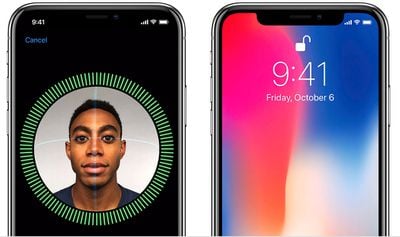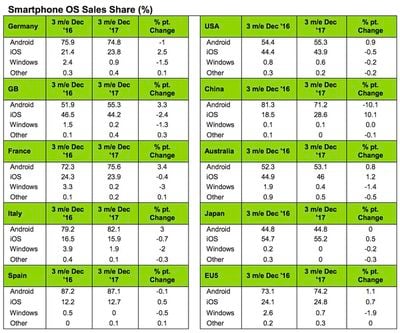Apple's iPhone X made it into the top three best-selling smartphones in December 2017 "across all key regions," according to new data tracked by Kantar Worldpanel. Specifically, Apple's new iPhone X climbed best-selling charts in Europe, Japan, Australia, the United States, and China, where it was the top selling model during the holiday season this year.

Although iOS market share fell 0.5 percentage points in the U.S. during the October to December 2017 period (down to 43.9 percent), the researchers noted that iOS loyalty "reached a new high of 96 percent." Ultimately, Kantar argued that Apple's staggered release of the iPhone 8, iPhone 8 Plus, and iPhone X has been a "sound" strategy with multiple price points offering entry points for a wider variety of consumers and "boosting" Apple's smartphone OS share in these key markets.
“The full results for the last quarter of the year show that Apple’s decision to release three new handsets over a staggered period, including the ultra high-end iPhone X, has been a sound one. With Apple’s existing release structure, expectations would always be that the flagship model would be the top selling device in key developed markets, but with the premium price of iPhone X, real life affordability has come into play. Given that in December iPhone X made it into the top three best-selling devices across all key regions, particularly in urban China where it was the top selling model, the pricing strategy seems to have been vindicated.”
In total, Apple's piece of the global smartphone OS market saw a percentage point increase across six markets in the three months ending December 2017. iOS market share climbed 0.5 percentage points in Spain and Japan, 0.7 in Europe, 1.2 in Australia, 2.5 in Germany, and 10.1 in China. Apple's growth in China has "continued to impress" Kantar, with the iOS smartphone sales share in China growing from 24.3 percent in September-November to 28.6 percent in October-December 2017.

Besides Apple, Kantar also discussed Samsung and the Android OS market share, noting Android's losses in a few markets (down 10.1 percentage points in China amid Apple's rise). The researchers pointed out that these losses were "cushioned" to an extent by the "rapid fall of Windows," which has a share now of under 1 percent in every market tracked by Kantar except Italy (1.9 percent).
With today's report from Kantar, this marks the final time we'll see smartphone OS market share data only focused on months in 2017. It should be interesting to see how Apple and iOS perform following the 2017 holidays and into the new year, amid ongoing reports in recent weeks focused on "weakened demand" and lowered production volume for the iPhone X in Q1 2018.






















